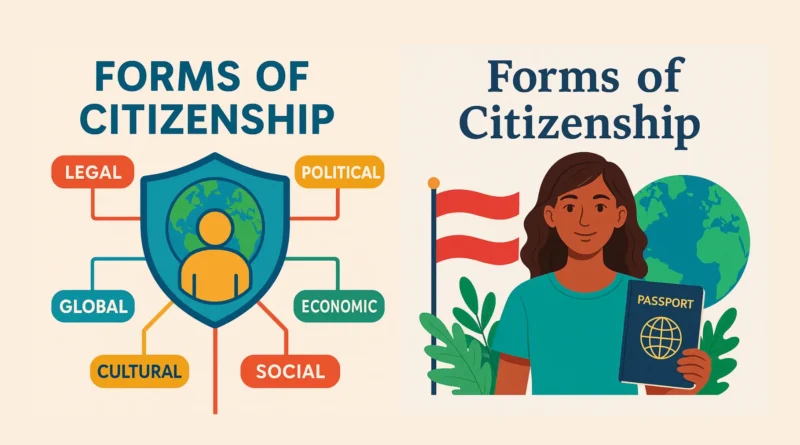Forms of Citizenship
Forms of Citizenship
Citizenship refers to the legal and political status of an individual within a state, granting them rights and imposing duties. It signifies the relationship between the individual and the state, encompassing identity, belonging, participation, and responsibility. Over time, the concept of citizenship has evolved and diversified into multiple forms, reflecting changes in society, law, and global interaction.
One of the most common forms is legal citizenship, which is granted by birth (jus soli or jus sanguinis) or naturalization. This form provides individuals with a recognized identity under the law, allowing them to enjoy civil and political rights, such as voting, holding public office, and accessing state protection.
Political citizenship emphasizes the active participation of individuals in democratic processes. It is not limited to voting but includes engagement in political debates, party membership, and civic activism. This form ensures that citizens play a role in shaping the policies and direction of their country.
Social citizenship, as described by T.H. Marshall, extends beyond legal and political rights to include access to welfare, education, healthcare, and social security. It reflects the idea that for full participation in society, individuals need a minimum standard of well-being and dignity.
Economic citizenship is linked to an individual’s economic contributions and rights. It includes the right to work, own property, and participate in the market economy. Some countries even offer citizenship through investment programs, allowing wealthy individuals to gain nationality based on financial contributions.
Cultural citizenship involves the recognition and respect for cultural identity, language, and practices. It promotes inclusion and multiculturalism, especially in pluralistic societies where diverse groups coexist.
With globalization, global or cosmopolitan citizenship has emerged, emphasizing responsibilities and identities beyond national boundaries. It encourages individuals to think of themselves as members of a global community, concerned with issues like climate change, human rights, and global justice.
In conclusion, citizenship is no longer a singular or fixed concept but a multi-dimensional one. These various forms—legal, political, social, economic, cultural, and global—highlight how individuals relate to the state and the wider world. Understanding these forms is crucial for fostering inclusive, just, and democratic societies.
Click Here for More
Explore More Offers
Forms of Citizenship Forms of Citizenship Forms of Citizenship Forms of Citizenship Forms of Citizenship Forms of Citizenship Forms of Citizenship

